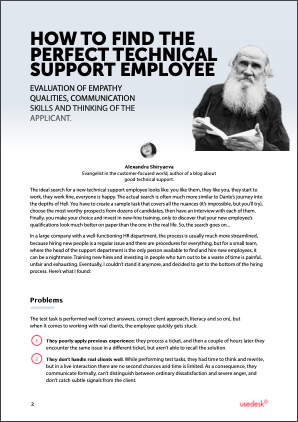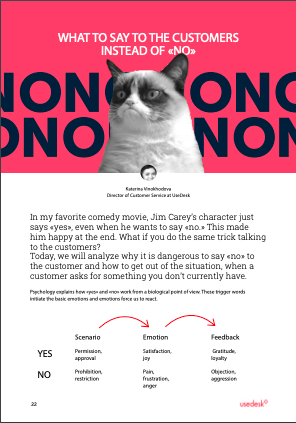Request a Demo
Send us a request for an online demonstration at the time that's convenient for you. We will give you an overview and answer any questions you may have about the system.
By clicking the button, you agree that you have read our Privacy Policy
4 TIPS FOR SUCCESSFUL CUSTOMER SUPPORT ROTATION

Katerina Vinokhodova
UseDesk Co-Owner
Learning customer support science is similar to learning any other skill: you are learning by doing. Reading books is undoubtedly helpful, as well as watching someone swimming and trying to imitate. However, if no water goes up your nose, knowledge from books will not help when you start sinking.
Many big companies have implemented weekly job rotation practice when a team member is thrown into the support line and answers the most difficult questions.
At first sight, the opportunity to go into battle, learn the product better, and understand what bothers the customers is inspiring. However, one may be afraid of failure. We pick low-hanging apples and skip the complex issues leaving them for more experienced agents to handle. This attitude does not help learn new skills and get new knowledge needed to perform the support responsibilities successfully.
Every lesson is learned in the same way as the muscles are built: there is no growth if there is no resistance. Whether you are a new hire in support or want to learn more about the role, below are some tips that will help along the way.
Many big companies have implemented weekly job rotation practice when a team member is thrown into the support line and answers the most difficult questions.
At first sight, the opportunity to go into battle, learn the product better, and understand what bothers the customers is inspiring. However, one may be afraid of failure. We pick low-hanging apples and skip the complex issues leaving them for more experienced agents to handle. This attitude does not help learn new skills and get new knowledge needed to perform the support responsibilities successfully.
Every lesson is learned in the same way as the muscles are built: there is no growth if there is no resistance. Whether you are a new hire in support or want to learn more about the role, below are some tips that will help along the way.
Overcome Discomfort
You open an email and read through it — a customer left another service and is interested in seeing how good your service is — you close the email and start looking for another question. Stop and think for a minute. Why did you ignore the email? It should be admitted; the problem has caused you discomfort. Why did you not put the hands on it with enthusiasm?
In short, you do not have that level of confidence that comes with experience. What stops you from getting new experiences? A fear.
The more resistance you feel working with a difficult question, the more effort you need to apply to answer it. The feeling of discomfort is natural, and what happens next depends on your attitude only.
Jumping into a support role is scary because the team has established internal links and connections, and you do not want to be the one who mixes them up. Just like a child swimming in a pool, you need to have someone watching you.
To overcome the discomfort of joining the support team, can be more comfortable:
This type of "supervision" helps to avoid potential mistakes. The more experienced colleagues can explain the things that are new to you, and step-by-step, you will learn how to handle the most complex cases.
In short, you do not have that level of confidence that comes with experience. What stops you from getting new experiences? A fear.
The more resistance you feel working with a difficult question, the more effort you need to apply to answer it. The feeling of discomfort is natural, and what happens next depends on your attitude only.
Jumping into a support role is scary because the team has established internal links and connections, and you do not want to be the one who mixes them up. Just like a child swimming in a pool, you need to have someone watching you.
To overcome the discomfort of joining the support team, can be more comfortable:
- Look for the requests that are similar to a bid you are working at. How did the experienced agents handle it?
- Browse the knowledge base to find relevant information to handle the request.
- Save your answer as a draft.
- Ask the teammates to review the draft.
- The agent with more experience can review the draft, add comments to it, provide some tips on using specific terms, and provide helpful links to be sent to the customer.
- Once again, double-check the draft and reply to the customer.
This type of "supervision" helps to avoid potential mistakes. The more experienced colleagues can explain the things that are new to you, and step-by-step, you will learn how to handle the most complex cases.
Join a University Team
There is a great story about Marissa Mayer, former CEO of Yahoo. Early in her career, she had a 2% chance of getting a job at Google and 12 job offerings from other companies. Marissa once told, "The Story of Laura Backman" — her piano teacher's daughter. "During the first year of high school, Laura wanted to join a volleyball team. After the tryout, she faced a difficult choice: join a university team but be among the players waiting on the bench, or start playing with juniors." It was more tempting to start playing with juniors, but Laura has chosen the opposite. She knew that if she practiced with the best players, she would play better herself.
Surround yourself with people who challenge you, encourage you to learn and grow (that is why Mayer preferred Google).
Choosing between the uncomfortable position of being the last in line and being in a place where you just try the water is not easy. But remember, you can learn to jump higher only when you are trained with the best ones. Do not take the position of "just try" because it will not give any progress in the end. You have to dive head seeking discomfort.
Surround yourself with people who challenge you, encourage you to learn and grow (that is why Mayer preferred Google).
Choosing between the uncomfortable position of being the last in line and being in a place where you just try the water is not easy. But remember, you can learn to jump higher only when you are trained with the best ones. Do not take the position of "just try" because it will not give any progress in the end. You have to dive head seeking discomfort.
Cultivate the Habit of Focus
Remember the saying about two rabbits: the man who chases many things finishes neither of them.
When answering to requests is only a part of your job duties, it is vital to maintain a schedule and procedures to distribute tasks.
I would recommend those having a crazy schedule: allocate blocks of time in the morning or later in the afternoon, when you have a fresh mind, to work on the tasks with a high priority.
Incoming requests may form a black hole that sucks you so fast that you will barely notice it. It is important to choose the right work rhythm and distribute energy during the workday to not lose the quality and be attentive to the needs of the customers.
Your goal is to find the golden mean: on the one hand, your basic work has to be done, and you need time to do this; on the other hand, you are expected to answer the customers' questions quickly. This skill is tough to learn, especially if you are not a part of the support team, but you can learn it from colleagues. Play with your schedule. Do not try to answer all requests at once but divide the stream into groups of 5-10 tickets.
You can reach balance by trying and falling down.
When answering to requests is only a part of your job duties, it is vital to maintain a schedule and procedures to distribute tasks.
I would recommend those having a crazy schedule: allocate blocks of time in the morning or later in the afternoon, when you have a fresh mind, to work on the tasks with a high priority.
Incoming requests may form a black hole that sucks you so fast that you will barely notice it. It is important to choose the right work rhythm and distribute energy during the workday to not lose the quality and be attentive to the needs of the customers.
Your goal is to find the golden mean: on the one hand, your basic work has to be done, and you need time to do this; on the other hand, you are expected to answer the customers' questions quickly. This skill is tough to learn, especially if you are not a part of the support team, but you can learn it from colleagues. Play with your schedule. Do not try to answer all requests at once but divide the stream into groups of 5-10 tickets.
You can reach balance by trying and falling down.
Customers as a Source of Enlightenment
A person that works in a department other than customer support has some advantages. Marketing specialists get an idea of customers from first-hand experience; engineers find out what needs to be fixed. Managers translate the proposals for improving into a business plan; product managers turn theories into experiments following the customers' feedback.
Before the rotation, most of your guesses and insights came from books, articles, lectures, and many other sources — but you still were in lack of practical knowledge about the basics underlying each business: the customers. Interaction with customers on the first line teaches you a unique communication style that goes beyond the usual business context; you get some ideas that will add value to your work and expand your creativity. Finally, you will overcome your fear. These are what the customer support experience gives you. I promise you will appreciate that experience.
Before the rotation, most of your guesses and insights came from books, articles, lectures, and many other sources — but you still were in lack of practical knowledge about the basics underlying each business: the customers. Interaction with customers on the first line teaches you a unique communication style that goes beyond the usual business context; you get some ideas that will add value to your work and expand your creativity. Finally, you will overcome your fear. These are what the customer support experience gives you. I promise you will appreciate that experience.
Share with your colleagues:
Did you like this article?
Error get alias
We know a lot about customer service
Once every two weeks, we will send exciting and valuable materials about customer service - articles, cases, and system updates. Do you mind?







